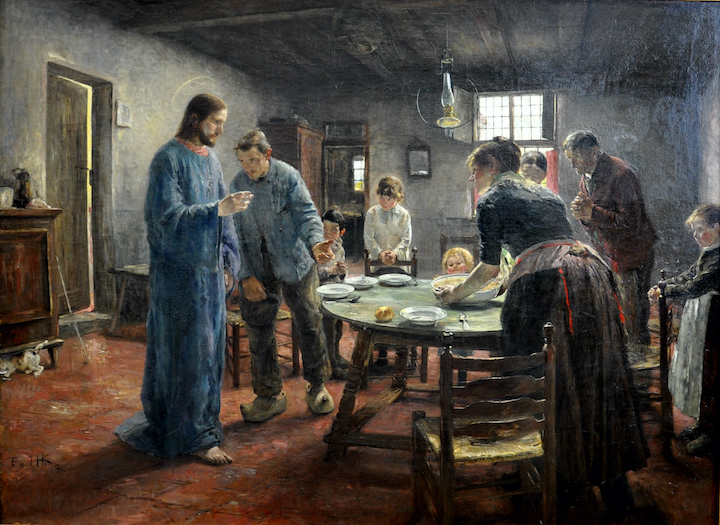Now that we are far enough from Christmas to not offend anyone, one might ask why people started sending pictures of family as Christmas cards? Perhaps one should also ask why many people no longer say grace before meals? Or do not attend Mass. . .you get the picture. What is going on?
These are serious problems, not merely changes in fashion: as St. Thomas Aquinas once explained, “man should not be contented with being united by faith to God’s truth, but ought to confess his faith outwardly.”
This was not just some sort of “pious admonition,” but has to do with the nature of faith itself. The Gospels tell us that the love of God and the love of neighbor are closely interrelated. So too, the Letter of James speaks of “the one who peers into the perfect law of freedom and perseveres and is not a hearer who forgets but a doer who acts.”
In fact, Aquinas explained that in the right situations, if we do not express our faith in actions then “we would deprive God of due honor, or our neighbor of a service that we ought to render him.” Both God and neighbor are part of the consideration of how to do something.
What are the right situations? Ever helpful, Thomas went on to say that, for example, “if a man, on being asked about his faith were to remain silent so as to make people believe either that he is without faith, or that the faith is false, or so as to turn others away from the faith; for in such cases as these, confession of faith is necessary for salvation.”
Acting without faith or appearing to have no faith are not trivial stances, however much the world regards them as of little real substance, especially when the consequences are so serious.
If you send a card at Christmas time, you should feel compelled by the season to mark your actions clearly with reference to Christ’s birth. Christmas is the celebration of actual historical events. That is the context and the only valid reason for the Christmas cards. You can send family pictures at any time. I am not judging anyone’s interior faith, but external actions are something that can be evaluated objectively, as St. Thomas affirms.
Among the faithful, there seems to be a widespread drift towards leaving aside external actions even though they are the way that faith touches the external world and changes it. This is rapidly turning Catholicism into a mere idea and not a way of life based on historical events.

People are bowing to the Enlightenment idea that religion is just an idea; so you can have your idea of Christianity, and I can have mine. Concrete historical events, however, create different situations that demand a response. They cannot be entirely shoved away or neglected. They stand, even when we ignore them. Like them or not, they are part of our world and will stand in judgment of us when we are ultimately judged.
As we express the truth in Christmas cards with nativity scenes, we join Christ’s mediation of the great mystery of salvation to the world. Someone sending a picture of the Nativity is an intermediary in God’s reaching out to the addressee and saying to him “Hey, I sent my Son into the world for you.” They are also acts of adoration and acts of sacrifice because we go out of our way to send them.
On the grace before meals, to use Thomas’ words, when we do not say that prayer, it “deprives God of his due honor.” Why? Because a person or family ignore a chance to acknowledge that this meal ultimately comes from God as his gift. Yes, there are intermediaries, but no God means no food, because all of the intermediaries and the growth of food itself all come from God!
We cannot know for sure, but does the drift away from the external expressing of faith mean that there are also fewer truly charitable works? It may be one of the attitudes behind the decline in the numbers of people going to Mass as well, for example, or even may contribute to failure in marriages. We cannot know for sure, but we should pose the question: are there fewer external expressions of faith between husbands and wives – and thereby a lesser bond where God does not enter daily into married life?
Catholicism is amazingly public unless one swallows the Enlightenment myth about how faith is supposed to be a private thing; or the myth that the big questions will be handled by the elite as they pat us on the head and tell us not to worry.
In contrast, instead of imagining the social elite being the source of meaning, the divine Jesus Christ really is the source of all meaning. Hence, Catholicism “brings to mankind light kindled from the Gospel and puts at its disposal those saving resources which the Church herself, under the guidance of the Holy Spirit, receives from her Founder.” (Vatican II)
Catholics cannot do this if they hide the light from friends, the marketplace, the school, and the law courts. And the consequences are no small thing. Little errors in the beginning, as that wise pagan Aristotle taught the Church, lead to larger errors in the end.
*Image: The Mealtime Prayer by Fritz von Uhde, 1885 [Alte Nationalgalerie, Berlin]














